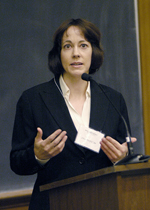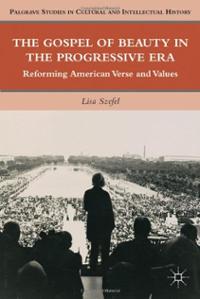 Lisa Szefel thrives within the tradition of historian as cultural critic. Trained at the University of Rochester, a program known for its cultural critics, Szefel earned her doctorate in 2004 and distinguished herself through her teaching and scholarship while still a graduate student. After Rochester, Szefel was the recipient of prestigious fellowships from the American Academy of Arts and Sciences, the NEH, and the Harry Ransom Center at the University of Texas. She was a lecturer at Harvard University in the Department of History and Literature for four years before moving to Pacific University in Forest Grove, Oregon.
Lisa Szefel thrives within the tradition of historian as cultural critic. Trained at the University of Rochester, a program known for its cultural critics, Szefel earned her doctorate in 2004 and distinguished herself through her teaching and scholarship while still a graduate student. After Rochester, Szefel was the recipient of prestigious fellowships from the American Academy of Arts and Sciences, the NEH, and the Harry Ransom Center at the University of Texas. She was a lecturer at Harvard University in the Department of History and Literature for four years before moving to Pacific University in Forest Grove, Oregon.
Szefel is at present an associate professor of history at Pacific University in Forest Grove, Oregon, where she offers lecture courses as well as upper-level seminars on topics that range from American conservatism to the Civil Rights Movement, and seminars in Pacific’s first-year program. She has been recognized for excellence in teaching and research at Pacific and has lectured widely both in the United States and abroad.
Szefel is the author of the highly regarded book, The Gospel of Beauty in the Progressive Era: Reforming American Verse and Values (Palgrave Macmillian, 2011), which was reviewed at the blog by Amy Wood. She explains that The Gospel of Beauty “charts the work of poets, critics, and editors who promoted reform by popularizing poetry. They worked behind the scenes to create an institutional infrastructure to support authors who addressed the problems inherent in contemporary life. I bring to center stage the story of the editors, anthologists, critics, and writers who believed that poetry reading facilitated self-knowledge and social justice. Situated between the genteel tradition and the avant garde, they linked creativity to moral obligation and, in doing so, refashioned Americans’ understanding of both modernism and modern life.”
She is currently at work on a intellectual biography of Peter Viereck and his role in shaping modern conservatism. Szefel had Viereck as a history professor when she attended Mt. Holyoke College as an undergraduate. Viereck is credited with introducing the terms “new conservatism” and stands as significant figure in the origins of the conservative movement that many of Szefel’s peers now study.
Szefel has written for the History News Network on the 1970s and, most recently, Daniel T. Rodgers’s The Age of Fracture. That essay formed the core of her remarks at a roundtable about Rodgers’s book at the 2011 S-USIH conference in New York City. Szefel’s essays have appeared in the New England Quarterly and the Callaloo: The Journal of the African Diaspora. An essay that appeared in Callaloo on William S. Braithwaite, was chosen as a “Notable Essay for 2006” for the Best American Essays, 2007, ed. by David Foster Wallace.

0